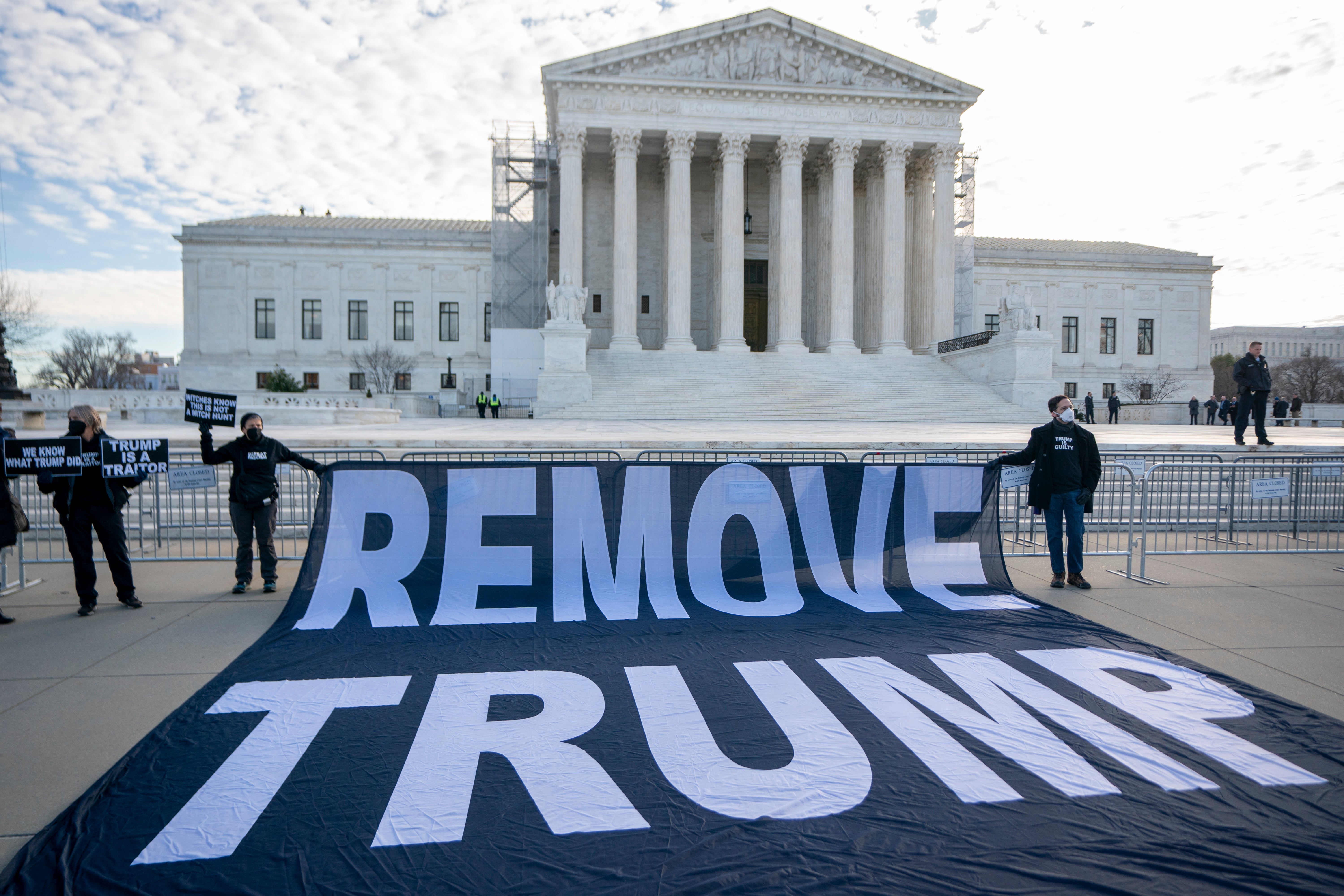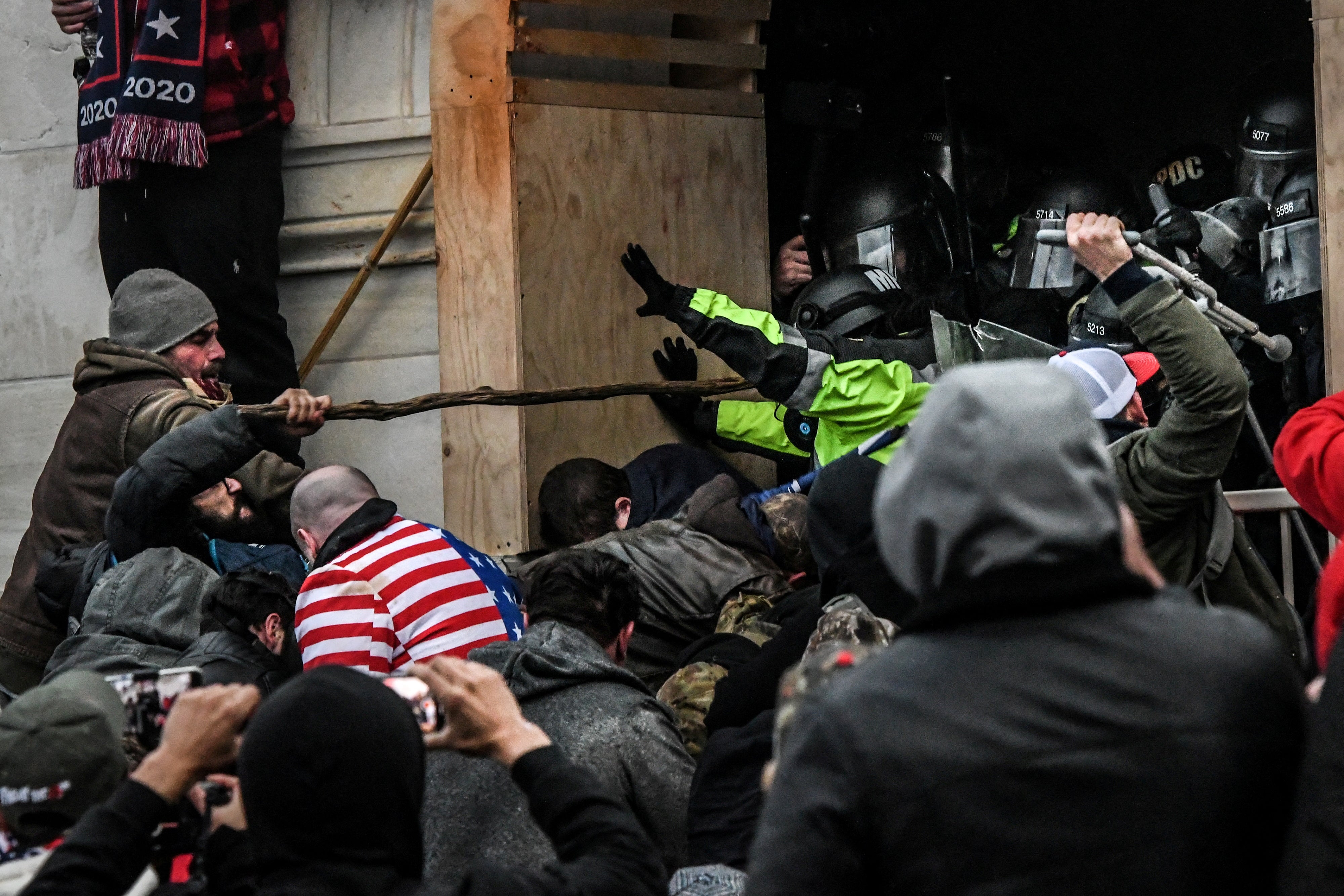Trump called January 6 beautiful. His lawyer called it ‘criminal’
The former president’s lawyer told the Supreme Court that January 6 was ‘shameful, criminal, violent’
Your support helps us to tell the story
From reproductive rights to climate change to Big Tech, The Independent is on the ground when the story is developing. Whether it's investigating the financials of Elon Musk's pro-Trump PAC or producing our latest documentary, 'The A Word', which shines a light on the American women fighting for reproductive rights, we know how important it is to parse out the facts from the messaging.
At such a critical moment in US history, we need reporters on the ground. Your donation allows us to keep sending journalists to speak to both sides of the story.
The Independent is trusted by Americans across the entire political spectrum. And unlike many other quality news outlets, we choose not to lock Americans out of our reporting and analysis with paywalls. We believe quality journalism should be available to everyone, paid for by those who can afford it.
Your support makes all the difference.It took roughly one hour into an historic US Supreme Court hearing on Thursday for the justices to get to a question at the heart of Donald Trump’s disqualification from Colorado’s ballots.
Was the attack on the US Capitol on January 6 – mounted by a mob by the former president’s supporters, fuelled by his ongoing election lies and his call to “fight like hell” on his behalf – an act of insurrection, and was then-president Trump responsible?
The former president has flatly rejected the word and downplayed the attack as he paints himself as a victim of political persecution. In front of the Supreme Court, one of his lawyers rejected the term. But he called it “criminal”.
Section 3 of the 14th Amendment holds that “no person” who swore an oath to uphold the Constitution can hold any office, “civil or military, under the United States,” if they “engaged in insurrection or rebellion against the same”.
Last year, a Colorado judge determined that Mr Trump not only “engaged” with insurrection, he also “acted with the specific intent to incite political violence and direct it at the Capitol with the purpose of disrupting the electoral certification”.
Colorado’s Supreme Court later affirmed that his actions “constituted overt, voluntary, and direct participation in the insurrection,” rendering him ineligible for office under the scope of the 14th Amendment.
On Thursday, Justice Ketanji Brown Jackson pressed the former president’s attorney for his “position” on the events of that day.
January 6 was a “riot,” according to attorney Jonathan Mitchell. An insurrection, he said, “needs to be an organised, concerted effort” to overthrow the government.
“A chaotic effort to overthrow the government is not an insurrection?” Justice Jackson fired back.
“We didn’t concede that it’s an effort to overthrow the government, either,” Mr Mitchell said. “This was a riot. It was not an insurrection. The events were shameful, criminal, violent – all of those things. But it did not qualify as insurrection.”
An admission from one of Mr Trump’s attorneys that the Capitol attack constituted “criminal” actions – in front of the nation’s highest court – follows the former president’s own attempts to evade liability from criminal charges connected to his attempts to overturn 2020 election results.
He has also repeatedly called the hundreds of convicted January 6 defendants “hostages” and vowed to pardon them, if he’s elected to the White House.
Rioters are “patriots,” he said. January 6 was a “beautiful day.”
“The love in the air,” he said later that year. “I’ve never seen anything like it.”
Mr Trump opened his first official rally of his 2024 campaign with a song from a prison choir of men jailed in connection with the Capitol attacks before promising “retribution” for his followers.
The so-called “J6 Prison Choir” includes a group of defendants who remain in a Washington DC jail for crimes that, according to federal prosecutors, “were so violent that their pretrial release would pose a danger to the public”.
Days after federal prosecutors warned that they intend to use his endorsement of their alleged actions in the election conspiracy case against him, Mr Trump called them “hostages”.
“I’m inclined to pardon many of them,” he said during a CNN town hall last year. “I can’t say for every single one, because a couple of them, probably, they got out of control.”

More than 1,300 people face criminal charges in connection with the Capitol attack, acccording to the US Department of Justice.
Nearly 500 people are charged with assaulting or impeding officers or employees, and more than 100 are charged with using a deadly or dangerous weapon.
In his arguments to the Supreme Court, Mr Mitchell said that “even an admitted insurrectionist” could still be allowed on ballots, and only Congress should be able to decide whether that candidate should be removed from office – but only after they’re elected, not while they’re still running.
The “insurrection” question has been looming throughout the hundreds of criminal cases against rioters, though it’s a charge that hasn’t been brought against any of them. The federal election subversion case against the former president charges him with conspiracy and obstruction for a multi-state scheme to overturn 2020 results, a pressure campaign against officials and his then-Vice President Mike Pence, and his failure to stop a mob from rejecting the results by force.
The judges in Colorado and Maine’s secretary of state have all determined that the attack amounted to an insurrection, with then-President Trump at the centre of it.
The district court ruling in Colorado said Mr Trump “acted with the specific intent to disrupt the Electoral College certification of President Biden’s electoral victory through unlawful means; specifically, by using unlawful force and violence”.
Mr Trump “cultivated a culture that embraced political violence” and “intended for the crowd to engage in violence when he sent them to the Capitol ‘to fight like hell,’” Judge Sarah Wallace wrote.
The Colorado Supreme Court agreed.

But on Thursday, Supreme Court justices appeared skeptical that states have authority to disqualify federal candidates without permission from Congress.
Chief Justice John Roberts suggested that the “plain consequences” of Colorado’s position would trigger a “pretty daunting consequence” and throw American elections into chaos.
“Surely there will be disqualification proceedings on the other side” and “a goodly number of states will say whoever the Democratic candidate is, you’re off the ballot,” he said. “And it will come down to a handful of states that will determine the presidential election.”
Jason Murray, an attorney representing a group of Colorado Republicans and independent voters who sued to remove Mr Trump from the ballot, argued that “the fact that there are potential frivolous applications of a constitutional provision” shouldn’t be reason to stop any challenge.
Justice Roberts cut him off, suggesting that one person’s “frivolous” argument is another’s legitimate one.
“Insurrection is a broad, broad term,” he said.
He argued that the Supreme Court, then, would be left to decide “whether it was an insurrection when one president did something as opposed to someone else doing something.”
“Then what do we do, do we wait until near the time of counting the ballots and go through which states are valid and which states aren’t?” he asked. “Other states may have different views about what constitutes insurrection … And now you’re saying, well, that’s alright because somebody– presumably us – are going to decide, ‘well, they said they thought that was an insurrection and they were wrong, maybe they thought it was right, and we have to develop rules for what constitutes an insurrection.’”
“Yes, your honour,” Mr Murray said. “Just like this court interprets other constitutional provisions, this court can make clear that the insurrection against the constitution is something extraordinary.”

Join our commenting forum
Join thought-provoking conversations, follow other Independent readers and see their replies
Comments